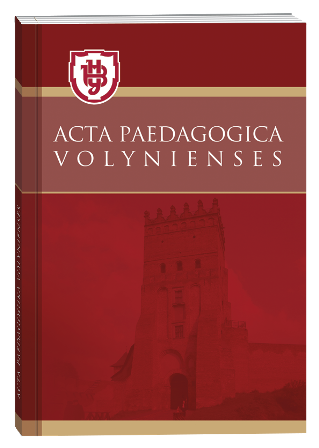DEVELOPMENT OF CRITICAL THINKING IN CHILDREN OF YOUNGER SCHOOL AGE IN LANGUAGE AND LITERARY EDUCATION FIELD USING INNOVATIVE TECHNOLOGIES
DOI:
https://doi.org/10.32782/apv/2022.4.2Keywords:
critical thinking, children of primary school age, innovative technologiesAbstract
The article found that critical thinking is one of the key competencies and reflects all the main regularities of the definition of «thinking». It was determined that the formation of a personality capable of realizing this is impossible without the development of critical thinking in her from childhood. It was established that the main features of critical thinking and their manifestations in the real life of a person are, in particular, the ability of a person to independently analyze information, determine its essence, compare it with other information and draw its own conclusions; the ability to see errors or logical violations in the arguments of partners and in other sources of information. In general, modern children should be able to perceive factual material, carefully and critically analyze it, supplement it with their own research, find cause-and-effect relationships, synthesize their own statements, that is, when children learn to think critically, they learn to evaluate the results of their thought processes – to what extent the correct decision we made or how successfully we coped with the task, because nowadays the development of a modern child is carried out taking into account the competence approach, in accordance with the current regulatory framework. In particular, it is substantiated that the use of technology for the development of critical thinking contributes to more effective assimilation of knowledge, because the interactivity of the method is not aimed at memorization, but at a thoughtful process of cognition, at posing a problem and searching for its solution. It has been established that among the educational tasks, the formation of a conscious personality, its intellectual development, intellectual receptivity (the ability to learn new information; intellectual mobility, flexibility of thinking, which in the modern world) is an essential condition for relatively painless adaptation of the personality to constantly changing life circumstances is of primary importance.
References
Бєлкіна О. В. Проблема формування критичного мислення в учнів початкових класів. Проблеми педагогічних технологій : зб. наук. праць. Луцьк. 2000. № 1. С. 50–57.
Бєлкіна-Ковальчук О. В. Формування критичного мислення учнів початкових класів у процесі навчання : дис. на здобуття наук. ступеня канд. пед. наук : 13.00.09. Луцьк, 2006. 215 с.
Большакова І. Розвиток критичного письма. Початкова освіта. 2012 р. № 11. С. 3–7.
Державний стандарт початкової загальної освіти [електронний ресурс]. URL: http://dano.dp.ua/attachments/article/303/Державний%20стандарт%20початкової%20освіти.pdf (дата звернення 18.09.2022 р.).
Інтерактивні технології навчання в початкових класах / авт.-упор. І. І. Дівакова. Тернопіль : Мандрівець, 2013. 180 с.
Марченко О. Г. Формування критичного мислення школярів. Харків : вид. група «Основа» : «Тріада +», 2007. 160 с.
Макаренко В. М., Туманцева О. О. Як опанувати технологію критичного мислення Харків : вид. група «Основа» : «Тріада +», 2008. 96 с.
Методика навчання української мови в початковій школі : навч.-метод. посіб. / ред. М. С. Вашуленка. Київ : Літера ЛТД, 2011. 364 с.
Мороз А. В. Використання технології розвитку критичного мислення в освітньому процесі НУШ : навчально-методичний посібник. Поліський ліцей. Березне, 2021. 58 с.
Пономарьова К. Реалізація компетентного підходу в навчанні молодших школярів української мови. Початкова школа. 2010. № 12. С. 49–52.
Психологія / за ред. В. А. Крутецького. Київ : Вища школа, 1978. 283 с.
Савченко О. Ключові компетентності – інноваційний результат шкільної освіти. Рідна школа. 2011. № 9. С. 4–8.
Терно С. О. Теорія розвитку критичного мислення (на прикладі навчання історії) : посібник для вчителя. Запоріжжя : Запорізький національний університет, 2011. 105 с.
Тягло О. В. Критичне мислення : навчальний посібник. Xарків : Вид. група «Основа», 2008. 189 с.
Технології розвитку критичного мислення учнів / Кроуфорд А., Саул В., Метьюз С., Макінстер Д. ; наук. ред., передм. О. І. Пометун. Київ : Видавництво «Плеяди», 2006. 220 с.







